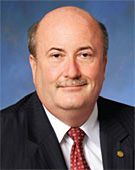
On March 8, the Royal Aeronautical Society, Washington Branch, presented its Trans-Atlantic Leading Edge Award to Flight Safety Foundation President and Chief Executive Officer William R. Voss for his work coordinating safety efforts in North America and Europe. Here are the remarks he made in accepting the award:
In accepting this first Trans-Atlantic Leading Edge Award, I feel the need to reflect on the role of the traditional transoceanic relationship in the context of the new global aviation market that is beginning to emerge. Ten years ago, the dynamics were pretty simple — 40 percent of the world’s traffic was in the United States, 40 percent originated in Europe, and the remaining 20 percent was scattered rather thinly across the world.
Regulators outside the United States and Europe adopted a wise and pragmatic strategy. They waited until the United States and the Europeans dealt with things, and then adopted those rules and strategies.
Things are looking different today, and they will be radically different tomorrow. Based on both the Airbus and Boeing market forecasts, the common assumption is that air traffic growth will be linked inextricably to the distribution of middle-class consumers. In 2010, there were about 1.8 billion people in the middle class around the world, and about 1 billion of them were in the United States and Europe. In 2030, there will be nearly 4.9 billion people in the middle class. The same billion or so are expected to reside in the United States and Europe, where middle-class growth is expected to be nil. The 3 billion new members of the middle class will show up in places like Asia and Latin America. That will certainly upset the balance of power that has driven aviation. Clearly, it is time to think about how the United States and Europe can fulfill the role of aviation leader in a very different world in the near future.
As members of the old ruling alliance, we can no longer assume that the future challenges of aviation will be faced in our own backyard. The future problems of training, growth and congestion will be fought on far-off battlefields. We will not even be aware of them unless we choose to make it our business. We will be dealing with parochial problems, like considering what to do when the Federal Aviation Administration runs out of regulatory authority and Europe runs out of inspectors.
So I have a simple message to my colleagues who have served this proud Trans-Atlantic Alliance. Do not assume that our past achievements guarantee future relevance. Destiny placed us at center stage for 50 years. Our significance over the next 20 years will be defined by our willingness to embrace other regional challenges, and our commitment to solve them. Doing anything less will guarantee a rapid retreat from the spotlight.